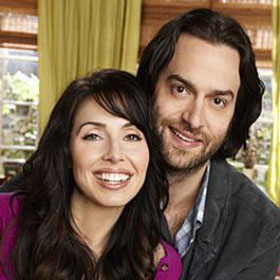Whitney

3/5
Whitney made its debut last fall on NBC with a tired premise – one of modern love. Comedian Whitney Cummings plays the titular character, a quirky thirty-something living with her boyfriend, Alex. Through their relationship, and through those of their friends, the show explores questions of matrimony – its importance in a society where it’s no longer taboo to live together outside of marriage – and the contemporary dating scene. Since its premiere, Whitney has dealt with that shade of love between dating and marriage, and the pitfalls and hiccups that occur when two people share their lives. Much of the comedic tension that happens in Whitney arises out of the characters’ reluctance to relinquish their independence to a significant other, or as a result of failed affairs, and their cynicism towards future relationships.
The mid-season premier last week continued to harp on this theme. Whitney and Alex have an argument about trust. Alex has a password on his phone and he refuses to tell Whitney what it is. All of this culminates when Whitney walks in on Alex, ahem, pleasing himself. It appears that there are still some boundaries between the couple; some things that remain private or separate from the relative public sphere of the relationship. Meanwhile, Lily and Neal, the token “new couple,” have decided to move in together, and Lily becomes uncomfortable with sharing some of the more intimate details of her life, like, say, using the bathroom or wearing a mouth guard to sleep.
When Whitney reveals to her friends that she “walked in” on Alex, the entire issue of trust gets turned on its head, and the episode ends with Whitney exposing herself, metaphorically and literally, in an attempt to reconcile with Alex. The biggest problem with this is that it’s precisely what the series has be doing since its beginning in fall. The show has already established the conceit of independent young adults maturing into better halves and the obstacles they encounter, the reservations they have about letting go of their former lives and subsequently their identities, mannerism and habits. It would seem that Whitney is a one trick pony, all the jokes falling back on the idea that the characters are inherently uncomfortable with their romantic situations, yet in the end accept love as the preferable option, and they come to a conclusion that usually has to do with compromise.
When it first premiered, there was hope that Whitney would offer sharp, funny criticism on the state of modern love and the dating scene, or at least make fun of conventional, outdated modes of courtship. But it seems that at the end of every episode the characters end up falling into the cliché they’re so consciously trying to avoid. There are some virtues to Whitney, mainly that it’s filmed in front of a live audience. The humor is sufficient; it hard not to laugh. But as a show that might tag itself as “not your parents sitcom about dating,” Whitney falls well short of groundbreaking.
RELATED ARTICLES
Get the most-revealing celebrity conversations with the uInterview podcast!





Leave a comment